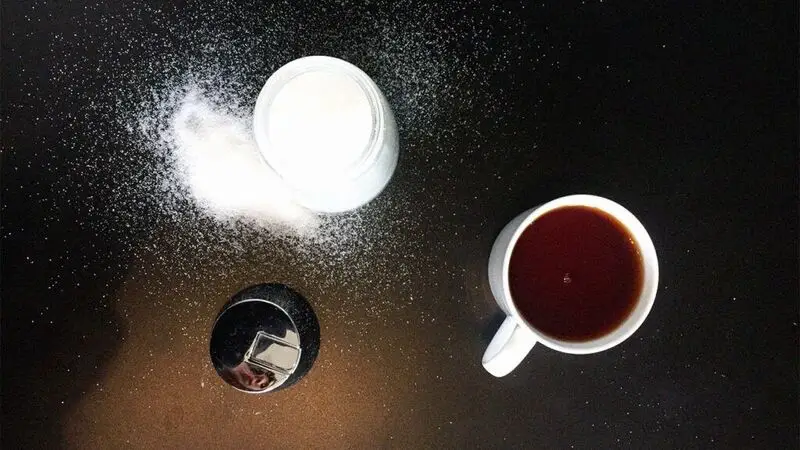
- A new study investigated how sucralose, a non-caloric sweetener, affects brain signals related to hunger.
- The researchers compared the effects of sucralose to water and sucrose (sugar) among healthy young adults.
- The findings suggest that sucralose may impact the brain in a way that could promote overeating.
At least
Some non-caloric sweeteners available include sucralose (Splenda), aspartame (Equal), and saccharin (Sweet ‘N Low). While people often use these when cutting calories, there are possible health effects.
Researchers from the Diabetes and Obesity Research Institute of the University of Southern California conducted a study using magnetic resonance imaging (MRI) scans to determine brain blood flow in the hypothalamus after consuming sucralose, sucrose, or water.
Increased hypothalamic blood flow suggests an increase in hunger signals in the brain.
The study findings indicate that sucralose may trigger strong hunger signals, potentially increasing appetite and leading to overeating when compared to sucrose and water.
The findings appear in
Sucralose is an artificial sweetener that, according to the existing research, has a “sweetness potency approximately 385 to 650-fold higher than sucrose [table sugar] by weight.”
The researchers examined how sucralose impacts people with a group of 75 adults ages 18 to 35 from three different weight categories: healthy, overweight, and obese.
Each participant attended three sessions where they drank either a sucralose-sweetened drink, a sucrose-sweetened drink, or water. The researchers used MRI scans to measure brain blood flow in the hypothalamus.
The hypothalamus plays many roles, including regulating body temperature and hormone release, as well as hunger.
Before consuming the beverage, participants underwent a baseline MRI scan and provided their hunger rating. After finishing the drink, the researchers collected more data after 10 minutes, 35 minutes, and 120 minutes.
Once the researchers concluded all sessions, they compared the MRI scans and the participants’ reports to determine how sucralose impacts brain signaling.
The researchers found that, overall, sucralose not only increased blood flow in the hypothalamus compared to water, but to sucrose as well.
This indicates a stronger hunger-related brain response which could lead to stimulating the appetite rather than suppressing it.
While this was the finding for the group as a whole, when breaking down responses among weight group and sex, the results vary a bit.
People at Healthy weights showed a stronger increase in hypothalamic activity after sucralose consumption than after sucrose.
People in the overweight category did not show significant differences in hypothalamic blood flow in response to any drink.
For people with obesity, hunger-related brain activity increased after drinking sucralose compared to water, but not compared to regular sugar.
While sucralose use did not seem to significantly affect hunger responses in people with overweight, the results suggest that it may still significantly impact a large percentage of people overall.
When taking sex into consideration, females showed a stronger response to sucralose over sucrose and water. The researchers believe this supports the notion that women may have a stronger brain response to food cues.
The researchers also noted that their functional connectivity analysis showed that, compared to table sugar, sucralose “significantly increased coupling between the hypothalamus and the anterior cingulate cortex.” This is significant because this area of the brain impacts reward processing and could intensify food cravings.
Taking a look at how participants rated their hunger levels, at the start of the experiment, people reported similar hunger levels across all drink sessions — their initial hunger was about the same no matter which drink they were about to consume.
However, the type of drink the participants drank affected how they rated their hunger afterward.
The participants felt hungrier after consuming sucralose versus sugar but did not report this effect compared to drinking water. The researchers believe that sucralose does not trigger hormones that tell the body it is full.
While the researchers note that this area needs more research, the findings suggest that the non-caloric sweetener sucralose may inadvertently affect the brain and trigger the hunger response.
Considering that many people use this sweetener to avoid calories and lose weight, this is important to keep in mind when making food and beverage choices since sucralose has the potential to cause hunger and increase food intake.
Mir Ali, MD, a board-certified general surgeon, bariatric surgeon, and medical director of MemorialCare Surgical Weight Loss Center, spoke with Medical News Today about the study.
“Based on this study, it seems that the brain processes non-caloric sweeteners to the same or greater extent than actual sugar,” said Ali.
Ali said the study findings may impact clinical recommendations.
“We already recommend that our patients emphasize protein and non-starchy vegetables in the diet and minimize carbohydrates and sugars,” Ali noted. “After this study, I’m also inclined to recommend my patients minimize non-caloric sweeteners as well.”
Eliza Whitaker, MS, RDN, founder and registered dietitian at Nourished Nutrition and Fitness, also chimed in on the study for MNT:
“This could suggest that the brain expects energy from calories when eating something sweet. However, this expectation is not met when consuming non-caloric sweeteners, like sucralose, which may prevent the processes within the hypothalamus that reduce appetite after eating something sweet from occurring the way they do when consuming calorie-containing sweeteners.”
Whitaker said the study findings would not impact clinical recommendations at this time, since more research is needed, but did say that it may need to be assessed on a case-by-case basis.
“It may be beneficial to assess sucralose intake for someone who has made other dietary adjustments and feels they are still unable to reach their health goals,” commented Whitaker.





